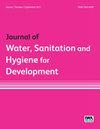Application of tannin-based coagulant for high-range turbidity surface water clarification
IF 1.4
4区 环境科学与生态学
Q3 WATER RESOURCES
Journal of Water Sanitation and Hygiene for Development
Pub Date : 2022-10-18
DOI:10.2166/washdev.2022.120
引用次数: 1
Abstract
This study aimed to evaluate the performance of a tannin-based coagulant in clarifying drinking water from a high-range turbidity river and characterizing the sludge. Tanfloc MTH product was selected for this investigation. The study site was surface water located in southern Brazil (Caveiras River, Brazil). Samples were collected just before the Parshall flume in the municipal water treatment plant in Lages (Brazil) for nine months, at least once a week. Jar testing evaluated turbidity removal, alkalinity consumption, optimal coagulant dosage, and settling velocity. After flocculation and settling, the sludge generated from the jar test was submitted to metal and thermogravimetric analyses. The use of tannin reduced the average water turbidity from 26.1 ± 56.1 to 0.94 ± 0.26 NTU, apparent color from 145 ± 190 to 3 ± 3 Pt-Co, and there was no variation in the pH. Additionally, the settling velocity of the flocs reached a maximum turbidity removal at 3.5 cm·min−1. Furthermore, the metal concentrations in the sludge showed a majority of aluminum and iron, and thermogravimetric analysis revealed 64% weight loss. In conclusion, Tanfloc presented the potential to be used in surface water clarification from the Caveiras river, and the extensive turbidity range observed during this study did not affect the operational stability.单宁型混凝剂在高浊度地表水澄清中的应用
本研究旨在评估单宁基混凝剂在高浊度河流饮用水澄清中的性能,并对污泥进行表征。Tanfloc MTH产品被选择用于本研究。研究地点为巴西南部的地表水(巴西卡韦拉斯河)。样本是在Lages(巴西)市政水处理厂的Parshall水槽前采集的,为期九个月,每周至少一次。转鼓试验评估了浊度去除、碱度消耗、最佳混凝剂用量和沉降速度。絮凝和沉淀后,对罐式试验产生的污泥进行金属和热重分析。单宁的使用使水的平均浊度从26.1±56.1降低到0.94±0.26NTU,表观色度从145±190降低到3±3Pt-Co,pH值没有变化。此外,絮凝物的沉降速度在3.5cm·min-1时达到最大去除浊度。此外,污泥中的金属浓度显示大部分为铝和铁,热重分析显示重量损失64%。总之,Tanfloc具有用于Caviras河地表水澄清的潜力,并且在本研究期间观察到的广泛浊度范围不会影响操作稳定性。
本文章由计算机程序翻译,如有差异,请以英文原文为准。
求助全文
约1分钟内获得全文
求助全文
来源期刊

Journal of Water Sanitation and Hygiene for Development
WATER RESOURCES-
CiteScore
3.10
自引率
11.80%
发文量
58
审稿时长
16 weeks
期刊介绍:
The Journal of Water, Sanitation and Hygiene for Development is a peer-reviewed journal devoted to the dissemination of high-quality information on the science, policy and practice of drinking-water supply, sanitation and hygiene at local, national and international levels.
 求助内容:
求助内容: 应助结果提醒方式:
应助结果提醒方式:


